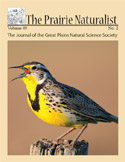Great Plains Natural Science Society

The Prairie Naturalist
Date of this Version
6-2015
Document Type
Article
Citation
The Prairie Naturalist 47:21–25; 2015
Abstract
Sampling adequate numbers of muskellunge (Esox masquinongy) is necessary to evaluate stocking success and to collect information on various population metrics (e.g., growth, condition, relative abundance). However, muskellunge are often difficult to sample with standard fish sampling gears. We collected muskellunge in trap nets of two different designs (large trap nets [1.5-m × 1.8-m frames, 1.5-m diameter hoops, double throated, single 1.5-m × 30.5-m lead and 19-mm knotless mesh] and small trap nets [0.9-m × 1.5-m frames, 0.9-m diameter hoops, single throat, single 0.9-m × 15.2-m lead and 19-mm knotted mesh]. We also estimated abundance of muskellunge (>600 mm total length) in three eastern South Dakota waters using marked and recaptured fish collected from the trap net comparisons. Sampling with both large and small trap nets was completed during thespring of 2013 and 2014 soon after ice-out. More muskellunge were collected in large than small trap nets at all three lakes. Mean total lengths of muskellunge did not differ significantly between large and small trap nets; however, length-frequency distribu- tions did differ between net designs. Regardless of trap net design, a small number of muskellunge were collected, likely due to low abundance (population range = 0.10 fish/ha to 0.47 fish/ha) in these populations. Thus, long-term monitoring is necessary to accurately assess populations and associated trends. Sampling with large trap nets during the spring combined with population estimates may improve the ability to monitor and manage muskellunge when compared to sampling with small trap nets.
Included in
Biodiversity Commons, Botany Commons, Ecology and Evolutionary Biology Commons, Natural Resources and Conservation Commons, Systems Biology Commons, Weed Science Commons


Comments
Published by the Great Plains Natural Science Society. Used by permission.